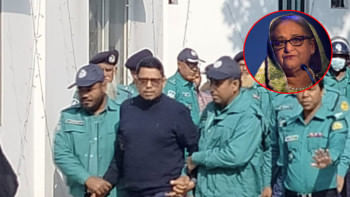Garo community rituals kick off as Wangala festival begins

The Garo neighborhoods in region are buzzing with excitement as preparations for the Wangala festival are gaining momentum.
The air is filled with the sound of drums, signalling the start of rehearsals for the festival that marks the Garo community's New Year celebrations.
This year, the Wangala festival will take place in Phulchara Garopara in Srimangal upazila of Moulvibazar on Sunday, continuing the tradition of honouring the harvest and celebrating the cultural heritage of the Garo people.
Known as the "New Year Festival," Wangala is a time for the Garo community to express gratitude to their grain god, Misi Saljang.

They believe that a bountiful harvest is a blessing from this deity. The festival marks the end of the harvest season, during which families offer prayers to thank the grain god, seek permission to consume the new crop, and wish for love, prosperity, and happiness for all.
REHEARSALS AND PREPARATIONS
During a recent visit, The Daily Star found that rehearsals for the festival were well underway. For the past month, Garo children have been practicing traditional dance routines, songs, and rhythms to be performed throughout the festival.
Teachers like Dipti Dio and dancer Moushumi Areng Mau are guiding the children, while dhak-dhol players—who provide the festival's rhythmic beat—rehearse alongside them. The preparation has been intense, as participants will perform, sing, and play the drums for hours during the festival.

Each Garo village in the region has organised groups of 10-15 children, who are being trained by local instructors. This collective effort reflects the community's deep sense of unity and cultural pride, which is at the heart of the Wangala festival.
A GLIMPSE INTO THE ORIGINS OF WANGALA
Garo Matabbar Committee President Anup Chishim shared that the roots of Wangala can be traced back to the Garo people's practice of shifting cultivation, or jhum, in the hilly regions.
In the past, when the first crops of the season were harvested, the community would offer a portion of the harvest to Misi Saljong, the crop god, in gratitude for the bounty and to ensure a prosperous future. This ritual of offering grains to the deity has been an important tradition ever since, he added.
Details of the 2024 Celebration
Partha Hajong, the president of the Wangala Festival Organising Committee, announced that this year's Wangala celebrations will take place on December 1, 2024, with cultural rituals beginning the day before. People from across the district, as well as Garo community members from various tribes—including Garaganjing, Kotchu, Ruga, Momin, Babil, Doal, Matchi, Migam, Chibak, Achdang, Matabeng, and Areng—are expected to participate in the event.
A FESTIVAL OF UNITY
Hajong also emphasiSed that while Wangala is a deeply religious and cultural event for the Garo people, it is also an occasion that fosters unity and camaraderie among all ethnic groups. The festival has become a symbol of harmony, as people from different backgrounds join in the celebrations, strengthening the bonds within the community.
Samuel Joseph Hajong, general secretary of the Garo Matabbar Committee, added that while the festival is grounded in Garo traditions, it is celebrated in the spirit of inclusivity, inviting people from all walks of life to take part in the festivities.
Wangala organisers are expecting a large influx of visitors, both domestic and international, who are eager to experience the vibrant dances, music, and rituals that make this cultural celebration so unique. As always, the festival will be an expression of tradition, religious sentiment, and community spirit, he added.


 For all latest news, follow The Daily Star's Google News channel.
For all latest news, follow The Daily Star's Google News channel. 



Comments